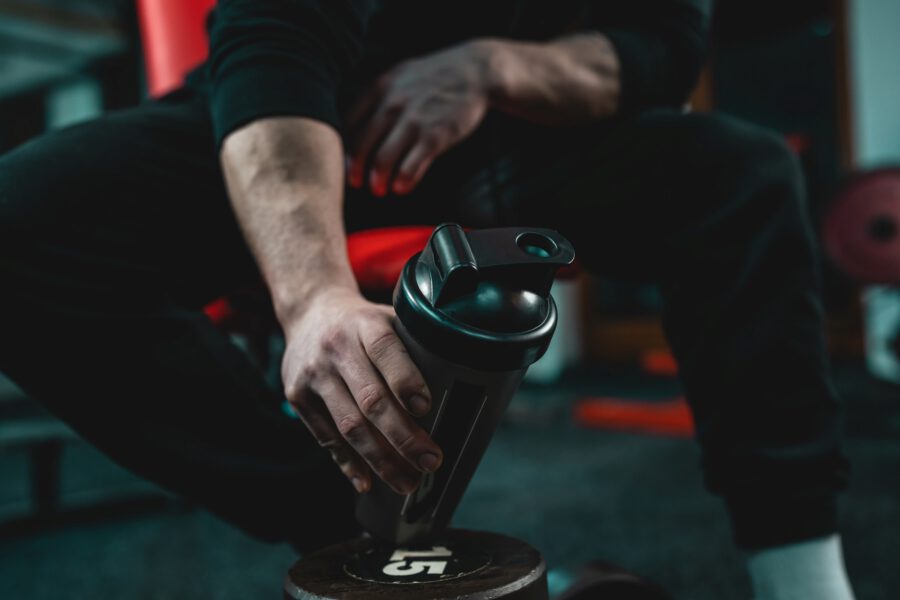5 Myths and Facts About Creatine and How to Supplement It
If you’re planning to take your fitness and bodybuilding to the next level through supplementation, creatine is probably one of the top choices that pop into your mind.
For decades, creatine has been the most studied supplement and most popular in the fitness world. It is known for boosting strength and enhancing muscle growth. Yet, despite extensive research supporting its benefits, many myths and misconceptions persist.
If you're a fitness enthusiast looking to understand creatine better, this guide is for you.
In this article we'll debunk the most common myths about creatine and provide you with the best way to use creatine for muscle growth.
Creatine is a natural substance found in muscle cells. It helps your muscles produce energy during heavy lifting or high-intensity exercise. While your body produces some creatine, it's also found in foods like red meat and fish.
Supplementing with creatine increases the adenosine triphosphate (ATP) levels in your muscles, resulting in enhanced strength, power, and endurance. Some studies suggest that creatine can also improve mental clarity and reduce mental fatigue.
Key benefits of creatine:
- Accelerate muscle growth
- Increase muscle strength
- Enhance workout performance
- Promote faster recovery
- Rehydrate muscle cells
- Boost brain function
- Increase muscle endurance
- Support bone health
- Protects the brain against cognitive decline
Like any other supplements, taking creatine can also have potential side effects.
Possible side effects of creatine:
- Stomach discomfort
- Bloating
- Muscle cramps (be sure to properly rehydrate to avoid this)
- Weight gain due to water retention
Myth 1: Creatine Is a Steroid
Fact: Creatine is not a steroid. Steroids are synthetic drugs that mimic the effects of testosterone, leading to significant hormonal changes and potential side effects. Creatine, on the other hand, is similar to amino acids and doesn't affect your hormones.
This means creatine doesn’t alter hormone levels in any way. It primarily works by increasing the energy available to cells and muscle tissues.
Unlike steroids, creatine enhances performance without impacting hormone levels
Fact: Numerous studies have shown that creatine supplementation at recommended doses does not harm kidney function in healthy individuals.
Concerns arose because creatinine, a breakdown product of creatine, is used as a marker for kidney function. However, creatinine is a byproduct that forms when creatine breaks down during energy production in muscles. This process is entirely normal and happens in everyone, even those who don’t take creatine supplements.
Only a small fraction of creatine converts into creatinine. When taken at recommended doses, the increase in creatinine levels is typically minimal and within a safe range for healthy kidneys to handle.
Studies have shown that long-term creatine use does not adversely affect kidney or liver function in healthy athletes. However, it's important for individuals with pre-existing kidney conditions to consult a healthcare professional before using creatine.
Creatine doesn’t harm healthy kidneys when taken at the recommended dosage.
Fact: Creatine may cause a slight increase in body weight due to water retention within muscle cells, but it does not lead to fat accumulation.
The initial weight gain (usually 1–2 kg) is due to increased intracellular water, which can enhance muscle volume and potentially improve muscle growth signals.
This water retention can make your muscles look fuller and may slightly increase your body weight, but it doesn't add fat. Moreover, creatine can aid fat loss indirectly by increasing workout intensity and muscle mass, which elevates resting metabolic rate.
Creatine can make your muscles look fuller due to water retention, but it doesn’t cause fat gain.
Fact: While creatine is popular among bodybuilders for its muscle-building properties, its benefits extend to athletes in various sports and even non-athletes.
Creatine supplementation has been shown to improve performance in high-intensity, short-duration activities such as sprinting, swimming, and cycling. Additionally, emerging research suggests potential cognitive benefits, including improved memory and reduced mental fatigue, especially in individuals with lower baseline creatine levels, like vegetarians.
Creatine enhances performance in high-intensity sports and may even boost brain function, making it beneficial for athletes and non-athletes alike.
Fact: There is no scientific evidence supporting the need to cycle creatine. Continuous supplementation at a maintenance dose is both safe and effective.
Unlike other substances, your body doesn't build a tolerance to creatine, so its benefits remain steady over time. Once your muscles are saturated with creatine, maintaining levels is simple with a daily dose.
Consistent daily use of creatine keeps levels in the body steady and effective without causing tolerance.
1. Choose the right type of creatine
The market is flooded with various forms of creatine, each claiming to be superior due to enhanced absorption or added benefits. However, scientific research consistently shows that creatine monohydrate is just as effective as any of the newer, more expensive forms.
Creatine monohydrate is the most studied form of creatine with a solid track record of safety and efficacy. Plus, it’s typically the least expensive option, without unnecessary additives to its formulation.
Creatine supplementation typically begins with an optional loading phase, where users take 20 grams per day, divided into four doses, for 5-7 days to rapidly saturate muscle stores.
After this phase, a maintenance dose of 3-5 grams per day is recommended to keep muscles saturated and sustain the performance and recovery benefits of creatine over time.
Note that taking more than necessary doesn’t lead to greater benefits.
Here’s a plan for women that will help you get strong with creatine:
And for men:
Being consistent with creatine supplementation is more important than the exact time you take it each day. Take creatine at a time that's convenient for you; consistency is more important than timing.
Some studies suggest that taking creatine as a post-workout supplement to boost muscle recovery may have a slight benefit, but its overall advantage is minimal.
High amounts of caffeine or equivalent to 2 to 3 cups of coffee may interfere with creatine’s effectiveness.
As a general recommendation, limit caffeine intake when taking creatine, especially during the loading phase. More importantly, be wary of pre-workout formulas you take that may contain both caffeine and creatine.
Creatine is a safe, effective supplement that can help you reach your fitness goals faster, especially if you are a beginner. By understanding the facts and ignoring the myths, you can make an informed decision so you can optimize your fitness based on your personal goals.
Be sure to follow the recommended dosage and prioritize your workout routine over your supplements. As the name implies, supplements are just complimentary to your time in the gym. It is still your hard work, effort, and dedication to a balanced whole-food diet that will give you the results you want.
Frequently Asked Questions
Creatine is a natural substance found in muscle cells that helps produce energy during high-intensity exercise. Supplementing with creatine increases ATP levels in muscles, enhancing strength, power, and endurance.
No, creatine is not a steroid. Unlike steroids, which mimic testosterone and affect hormone levels, creatine functions similarly to amino acids and boosts energy availability without altering hormones.
There is a common myth that creatine damages kidneys. However, extensive research shows that creatine is safe for healthy individuals when taken in recommended doses. It's important to stay hydrated while using creatine.
Creatine supplementation can accelerate muscle growth, increase strength, enhance workout performance, and promote faster recovery. It may also improve brain function and support bone health.
Some potential side effects of creatine include stomach discomfort, bloating, and muscle cramps. Weight gain due to water retention is also possible, but can be managed with proper hydration.
Creatine may enhance mental clarity by increasing ATP availability in brain cells, potentially reducing mental fatigue. For more on this, see The Brain-Boosting Effect of Creatine.
For optimal results, start with a loading phase of 20 grams per day for 5-7 days, followed by a maintenance dose of 3-5 grams daily. Pair supplementation with consistent workouts and proper hydration.

